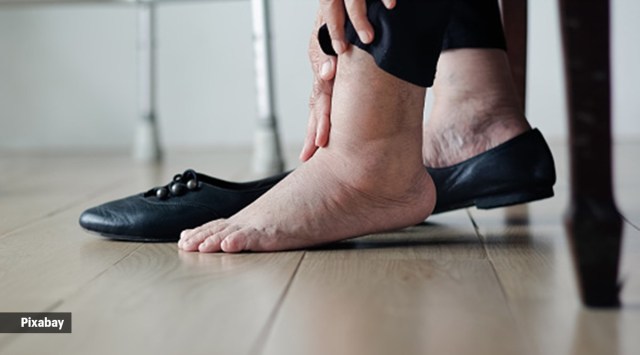📣 For more lifestyle news, click here to join our WhatsApp Channel and also follow us on Instagram
Swollen feet during pregnancy: When should you worry?
"If the swelling is mild, even small changes in one's lifestyle can relieve the same," said Dr Arati Adhe, Consultant, Gynaecology and IVF
 Due to hormonal changes in pregnancy, your body starts retaining extra water and fluids to meet the needs of the growing baby. (Source: Pixabay)
Due to hormonal changes in pregnancy, your body starts retaining extra water and fluids to meet the needs of the growing baby. (Source: Pixabay)During pregnancy, a woman’s body goes through a lot of changes. One such change is swelling in certain parts of the body, especially in the feet and ankles.
In an Instagram post, Dr Amina Khalid, a gynaecologist wrote, “Swelling of feet in pregnancy is a common symptom, but this can point towards many underlying conditions,” adding that if the swelling pattern is different and is present on other body parts as well then it must never be ignored.
Why your feet swell during pregnancy:
*Due to hormonal changes in pregnancy, your body starts retaining extra water and fluids to meet the needs of the growing baby.
*As pregnancy advances and the baby grows, the weight of the uterus and baby begins to put pressure on the veins of your legs, which reduces the ability of the veins to return blood to the heart. With the blood flow slowed down, pressure builds up inside the vessels, causing the water to leak out from the veins, leading to swelling you see on your ankles and feet.
View this post on Instagram
What is normal swelling?
*Swelling mostly restricted to your ankles and legs only
*No swelling of legs in the morning
*Swelling progresses throughout the day and is more in evening or night due to the pressure of baby weight
*Swelling reduces on rest and on elevating the legs
*No other symptoms along with it
The red flags
*Swelling present in morning and throughout the day. Not relieve by rest.
*Sudden increase in swelling or swelling only in one leg
*Blurring of vision or flashing lights in eye
*Dizziness
*Breathlessness
*Pain below chest
*Bad headache
*Decreased urine
*Vomiting
According to Dr Arati Adhe, Consultant, Gynaecology and IVF, P.D. Hinduja Hospital & Medical Research Centre, Khar, “If the swelling is mild, even small changes in one’s lifestyle can relieve the swelling.”
Following are the ways to prevent or manage swollen feet, as per the expert:
*Try to avoid extra salt in your diet. Don’t add extra table salt to your food, as it will reduce your sodium intake, which ultimately reduces your swelling.
*Try to include potassium-rich foods in your diet such as potatoes, bananas, spinach, beans, and fruits like pomegranate and oranges.
*Reduce caffeine intake. Caffeine usually acts as a diuretic, and causes more urination, hence it causes more water loss and increase in sodium. Also, take adequate amount of water.
*Try and keep a pillow to elevate your feet whenever lying down. Additionally, eight hours of sleep at night is advised.
*Try to avoid tight leggings, jeans and other clothing. It is advised to wear comfortable shoes as well.
*If allowed by your doctor, then 10 minutes post-meal walk is good for you.
*Wear compression stockings with doctor’s advice.
Concluding, Dr Adhe told indianexpress.com, “If you’re not relieved with these tips, if your swelling is increasing, or if it is visible on other parts of your body other than feet and is associated with diabetes, high blood pressure and other health conditions, then you should contact your doctor.”
📣 For more lifestyle news, follow us on Instagram | Twitter | Facebook and don’t miss out on the latest updates!
📣 For more lifestyle news, click here to join our WhatsApp Channel and also follow us on Instagram
- 01
- 02
- 03
- 04
- 05



























